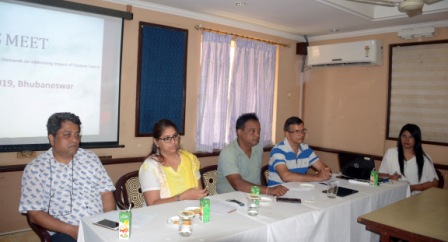BHUBANESWAR: Even as a fortnight has passed since the extremely severe cyclonic storm Fani wreaked havoc in Odisha and both the government and the civil society organisations are on their toes to accelerate the relief and rehabilitation process, there are a number of lacunae which need to be addressed, said Mr Manas Ranjan Mishra, a member of the ‘Civil Society Responds to Fani (CSRF).’
He was addressing a Press Meet to share the issues, challenges and recommendations to address the impact of the extremely severe cyclone Fani at Bhubaneswar on Tuesday on behalf of CSRF, a group of civil society organisations and concerned citizens, who have come together to speed up the relief and rehabilitation efforts.
‘No ration card, no relief’ still continues
Pointing out the lacunae in the relief distribution, Mishra, also the Executive Director of Vasundhara, a Bhubaneswar-based organisation that works for tribal rights and environment, said the affected people who do not possess ration cards have not received any support yet despite the government’s announcement that all affected families will be given Rs 2000 and 50 kg rice irrespective of their possession of ration cards. Such people include large numbers of poor people, who are left out due to errors in the selection process and additional errors by government officials.
Benefits for betel vine owners, mushroom farmers, small vendors
He appreciated the state government for introducing new packages for betel vines and mushroom cultivation which are not properly covered under Central Government guidelines. The government’s declaration of Rs 10,000 compensation for street and small vendors in 11 affected municipal areas is a welcome move. However, the people who have lost their shops, cabins, buildings, and assets in rural areas should also be covered.
Inadequate shelter materials, mosquito nets
The single polythene sheets provided to affected households are not adequate for providing shelter from sun and rain. The government should provide at least 3 tarpaulin sheets (not polythene sheets) to each of the affected households – one for humans, one for livestock and one for food grains. Besides, adequate mosquito nets should be provided to all households.
Women deprived of food, shelter
Sneha Mishra, Secretary Aaina and a member of CSRF, said as all public places with proper roofs (such as community halls, mandaps, temples etc.) are occupied by men, women have to spend the daytime under scorching sun or under makeshift shelters. This is the situation in several villages under Kushbenti panchayatof Brahmagiri block. As in many cases the cooked food supply is insufficient, women have been deprived of community lunch/dinner. Besides, there are apprehensions of increased child trafficking and trafficking of young girls. The government’s initiative of distribution of sanitary napkins in affected areas is a welcoming move, but it hasn’t reached all areas and especially to Dalit habitations, Ms Sneha added.
Need to reopen schools on time
Co-founder of CYSD, Jagadananda, underlined the need to reopen schools on the scheduled time in all the affected areas. Even if the school buildings are not repaired, the teaching-learning process should continue in cyclone shelters or any other buildings. While the Government has announced a pair of uniform in less affected areas and two pairs in more affected areas, it should also provide learning materials free of cost to the students. Initiatives of Aid et Action that is providing learning kits to students is commendable in such context, he pointed out.
